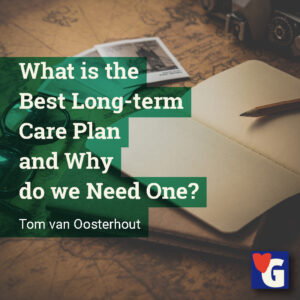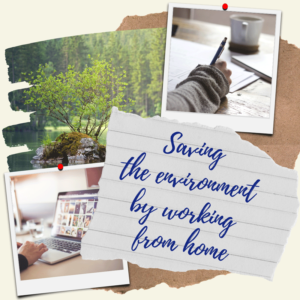
The question “What is the best long-term care plan?” is not discussed much. We tend to leave the preparation of this plan to care professionals. Whether this is the best choice though remains to be seen. Our long-term care deserves more consideration.
A good starting point for the debate about our personal long-term care plan is the way long-term care is funded at the moment. From there I will discuss our options to prepare for the best personal long-term care plan.
The maintenance of dignity and independence, access to care services and quality of life are the goals of long-term care. People want to live in their own homes and neighbourhoods for as long as possible.
Some of the links might be affiliate links. As an affiliate associate, we earn a small commission when you purchase any of the products offered through the shared links at no extra cost for you. This helps us to maintain this website.
Table of contents
Long-term care funding

There are various funding sources for long term care. The two most mentioned are public funds and private insurances. However, private insurances do not cover the full cost of care.
In 2011 in the USA total expenditure of long-term institutional care costs was estimated at 200 billion US dollars. These figures obscure, however, the real costs of long-term care. In practice, the overall burden of the costs of long-term care goes to private households.
Family members and friends deliver 70-75% of all long-term care. In 2011 the USA Congressional Budget Office estimated that the total economic value of unofficial or informal care exceeded 400 billion US-dollars.
Types of long-term care
Roughly speaking there are three types of long-term care: informal care, home and community care (including home health care) and nursing home care.

Informal care is provided by immediate family members (e.g. spouse or adult child), other relatives, friends, neighbours and non-profit citizen community service organizations. To provide informal care to a frail elderly person entails a substantial sacrifice of free time on the part of a caregiver. More than half of all informal caregivers have a full-time job as well.
Home and community care refers to formal services provided in-home or community-based settings. For every person in a nursing home, there are an estimated three persons with similar disabilities living at home in their neighbourhood receiving informal care.
Nursing homes provide specialized medical, nursing and social services in an institutional setting. In every country, nursing homes consume the largest fraction of long term care funding. Of course, with the exception of informal care costs.
Long-term care services and supports
The services and supports people receive depend on the type and seriousness of the impairments. Health services are almost all 100% specialized professional services. The other two most important types of services are ADL- and IADL-support.

Activities of Daily Living (ADLs)
Basic personal activities, including bathing, eating, dressing, moving around, transferring from bed to chair, and using the toilet.
Instrumental Activities of Daily Living (IADLs)
Tasks associated with running a household or living independently, such as using the telephone, taking medications, managing money, doing housework, preparing meals, doing the laundry, and shopping for groceries.
Residential settings
When people, suffering from severe functional limitations, require around-the-clock assistance, they often live in institutional settings. They are usually 85 years and over.
Institutional settings come in a variety of types. There are 2 institutional types of long-term residential care and 2 types of community-based care. Recently a fifth type emerged: independent living senior housing initiatives.

- Nursing homes. Residential institutions licensed to provide around-the-clock personal and professional nursing care.
- Residential institutions. These are residential institutions providing around-the-clock or incidental long-term care, without a license as a nursing home.
- Community-based institutional home care. These institutions offer basic services (e.g. meals, housekeeping, laundry) and health-related services (e.g. help with medications). Elderly people receiving services live at home in the community.
- Private homes. There are more and more commercial residential homes providing long-term care services.
- Independent living senior housing initiatives. Only recently some elderly initiate long-term institutional care themselves. They plan and buy or hire their own residence and hire their own staff, including professional nursing and medical staff.
Related: The Advantages of Co-housing, a Revival of the Village Sentiment
Dramatic growth in the demand of long-term care

The older people get the more chance they have to need long-term care support. During the first 10 years after people become 65 years of age some 20% suffer from impairments. This increases to a third for people aged 75 to 84 and to half of the people aged 85 and over.
The number of older people with impairments will rise dramatically in the next 30 years. In the USA alone the number of people over 65 rose from 8% in 1950 to 12% in 2000 and will rise to 20% in 2050. The number of people 85 and over will even grow more dramatically to 10 times its share in 1950.
As a consequence of the dramatic rise in long-term care demand, the need for assistance will increase sharply in the coming decades. State and private insurances will fund less and less. We will have to pay more ourselves. Moreover, due to demographic and labour market changes the possibilities for informal care will decrease.
What is the best long-term care plan?

The rise in long-term care demand and the decline in formal and informal services and support confront us with the question: What is the best long term care plan?
You can keep your fingers crossed and hope you’ll never end up in a residential long-term care facility. Although there is nothing wrong with such facilities, when you do end up there, you no longer have a choice left then.
When you have specific wishes for your personal long-term care, yet you wait until it’s your turn, is a rather risky option. Perhaps you prefer to end up in your own independent living senior housing initiative. If you do, the catch is that you have to start this initiative when you’re still relatively young and are able to set aside a substantial amount of your savings.
Funding is of course also possible when you buy yourself into an independent living senior housing initiative with the money you gain from selling your own home. Nursing and medical assistance can be private insurance or state-funded. Be aware that for such initiatives endurance is required.
In the end, the choice is yours. In our opinion, it is best to contemplate your options as early as possible, even when your conclusion leads to ‘I will hope for the best’. 🙂
What are your thoughts? Tell us in the comment box below.

At this time I give care to my Aunt who lives in my home. She is 88 and in good health for her age. She does have some problems and could not live in a house by herself.
I have a friend that does in-home care for older people that do not want to leave their home. She does light work and prepares meals when she is at work.
There are several ways to look for a long-term care plan as your article states. I have not given it much thought as my health has been pretty good for my 67 years. After reading your article, I think that looking out for my future life may be something that I put on my to-do list. I do own my home, what do you think of the reverse mortgages on the market today, are they a scam or legit?
John
Hi John,
Admirable that you take care of your aunt. She must be very lucky. As far as I know most older people don’t want to leave their own house. Did your aunt leave hers because she was unable to take care of herself anymore?
Even at an advanced age most people don’t think about long-term care. We tend to rely on family and friends and public care. Which is fine of course. Your aunt is the example how this worked out to her advantage. When you want a similar arrangement when your in your eighties, you indeed should give it some serious thought.
As to your question about reverse mortgages. This I’ve never given any thought. So I opened the page in wikipedia: https://en.wikipedia.org/wiki/Reverse_mortgage
The information is predominantly about English speaking Western countries. No information is given about countries in Europe.
After having read the introduction, I think it is a good idea. There are several catches though. Get independent consultation. Moreover, read all the small letters yourself and try to understand what they mean. When you want to leave your assets to children, grandchildren, or family, or even to a charity, a reverse mortgage is perhaps not the best idea.
However, when you’re older and want a couple of relaxed years not having to bother about money, this is a good option when you don’t have any savings. I have no idea what happens when you seriously need around-the-clock long-term care. Perhaps they want to strip you of all your money before given you any proper care. Or the care you would like. So you really need to give it some serious consideration. And talk to people who have a reversed mortgage.
Thank you for your comment John.
Stay safe, stay healthy.
Regards,
Tom
I read years ago an article about German seniors going to Thailand to live a worthy life. They are taken care of by Thai nurses, and all of them were positive because these are loving people who care for them. I think we should be allowed to use our money the way we love to. But the government takes your money away if you try to live in a country where the daily costs are cheaper. So, I think it is not right. People who decide to live in another cheaper country should have the possibility to live the life they wish.
In the Netherland, they get their AOW state pension but can’t live very well because life here is expensive. In my eyes, it is a disaster, and I see a lot because I am working as a nurse with most clients, be elderly or chronically. The government is criminal, in my opinion.
Hi Sylvia,
Thank you for your comment. I kindly disagree with you, the Dutch government is not criminal. I admit, in many other countries you will be able to find criminal politicians and administrators (civil servants). Corruption is rife in many countries and government officials and politicians take advantage of this, or are the drivers of this evil.
Of course it’s very well possible that there are criminal politicians and civil servants in The Netherlands. But if so, they are a very slight minority.
Nevertheless, the execution of the law can cause severe trouble for specific people that do not exactly match the rules or leave people in destitute because they receive insufficient income. This is very hard on those that have no proper pension or AOW. A problem that specifically hurts immigrants and people who lived in the former occupied countries, like Surinam and Indonesia (I prefer the use of the phrase ‘former occupied’ over ‘colonial’, because it is more clear about what the Dutch did there).
I don’t understand why people can’t take their money with them. We went to Spain and took all our money with us. We receive our pensions and AOW here. No problem. We declare our taxes in Spain as well as in The Netherlands. There are parts of our pension we never payed taxes for, so this we have to do now because the tax deductible money saved in the pension insurance is transferred to income. This is a regular, years old practice in many countries. No problem.
It’s possible there are no tax agreements between Thailand and The Netherlands. If so, people who move to Thailand will first have to pay taxes over the money they did never pay taxes on. Such as is the case with some of our pension insurances. This is common international practice. People who want to move to countries without proper tax agreements with their country of origin should inform themselves very thoroughly about such tax issues before they leave.
And there is more. The USA and Australia (perhaps many more countries, I only know it from these 2) did not sign the international agreement that pensioners are allowed to freely immigrate to these countries. Besides many Dutch farmers who moved to Canada, after having sold their farm in The Netherlands, did this without proper accountability about what they still owed the Dutch state. Because there where no proper tax agreements between Canada and The Netherlands, for years these farmers could not be addressed. Now there is such an agreement, many Dutch farmers in Canada are prosecuted for gross negligence. Which is fair I guess. Nobody is allowed to evade taxes. When everybody evades taxes, the elderly would not be able to receive their AOW.
For now, stay safe, stay healthy.
Regards,
Tom
Hi Tom. Thanks for the knowledge you’re sharing here. I’m taking care of my grandfather who is over 70 now, and I don’t feel like taking him to a residential long term care facility. Of course, I want the best long-term care plan for him…
However, I do have some questions since it’s my job to look after him right now.
How to pick him up off the ground if he falls? What meal recommendations can I give for easy meal preparation? Also some tips and tricks for maintaining balance in the shower, and finally any advice on safety devices for the home to help him?
Hi Warren,
Thank you for your comment. Good of you to take care of your grandfather.
Your question are very practical. I can’t answer them because I’m not an expert. What I can do is refer you to some websites where you can find the answers you need:
– The UK NHS has an informative website, there you’ll find for instance information about falls: https://www.nhs.uk/conditions/falls/
– The USA NIH/NIA (National Institute on Aging) has an informative website about food (and much more): https://www.nia.nih.gov/health/healthy-eating
I don’t know where you live, but I think there must be many organizations that can give you information and guidance or personal support with your questions.
For now, for your grandfather and you, stay safe, stay healthy.
Regards,
Tom
Hey Tom,
How you doing?
Firstly, I complete agree with you in that we should looking at our long-term care plan as early as possible.
However, I think much the same as pension and retirement planning in general, it’s not something that most people consider anywhere near early.
I was lucky enough to work in finance, so I understood the importance (and the huge financial difference) between starting a pension at age 30 compared to age 40.
That being said, the actual care required for myself or my family, well let’s just say this hasn’t been particularly high on my list of priorities.
I think this is a huge mistake on my part, and this is probably how the vast majority people view long-term care.
None of us likes thinking about growing older, and it’s almost as though if we ignore it then it might go away, LOL.
Unfortunately, this is never the case.
I, much like Hannie, became a full-time carer for both my parents, although for me it was much to nearer to the end of their lives.
We hadn’t made any specific provisions, and in truth, I probably provided the care that was equivalent, or far above and beyond, that of a nursing home.
Whether I, or my parents, would have wanted someone else providing this care is a completely different matter.
However, if we did require or decide to take professional care services, this would have to have been paid for from our own pockets.
And as you have quite rightly pointed out, this is very expensive.
I feel ever so slightly hypocritical in saying this, but I think looking into the best long-term health care plan as early as possible is essential.
As I say, it is something that most of us tend to avoid for as long as possible, but unfortunately it’s something that’s never going to go away.
Thanks
Partha
Hi Partha,
We’re okay. The sun is shining again. It’s some 15-20 degrees C outside in the afternoon. The city were our son lives, with his wife and two boys near Madrid, is totally covered by a meter of snow. The snow turned into ice because it’s freezing minus 10 degrees C. No traffic is possible. Walking on ice is slippery. The supermarkets are running out of supplies. Together with the pandemic, which is as badly handled in Madrid as the snow due to political infighting, the citizens are getting more desperate by the day. Although I must say that the family is coping very well. The grandchildren love the snow, but not the cold.
Back to your comment. For which I’m grateful again. Long-term care, fortunately, is reserved for a limited amount of people. There are people with protracted or chronic ailments who need around-the-clock care services. We tend to associate long-term care though with the elderly, more specifically with the eldest, most frail and vulnerable.
For sure, at the end of our lives, usually the only option left is to be cared for by others. Your parents were very lucky you took care of them. There’s nothing more preferable than the care of affectionate family members.
In welfare states, such as the countries in Europe, you might think that most care is professional care. That is not so. Family care is, very consistently over the past 50 years and throughout these countries (including the USA and Canada) some 70-75% of all care that is given. This has a tremendous impact on social life and the economies. Moreover, the next three decades, due to all kind of social developments (more older people, smaller families, more mobility, demographic spread), family care will decline. That is not very reassuring for you and us.
This is the most important reason for me to emphasize the importance of a long-term care plan.
Regards,
Tom